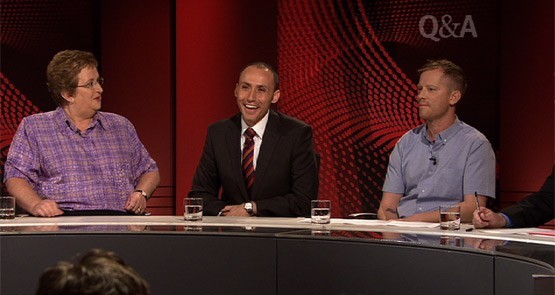
An ABC-commissioned review of the Q&A program conducted in the wake of the Zaky Mallah controversy by TV veteran Ray Martin and former SBS managing director Shaun Brown has found the national broadcaster’s panels to be dominated by men.
There were fewer female than male panellists, the review released today found, and the female panellists selected had fewer questions directed to them. They also had “far less” time to address those questions.
Over the period examined, there were 113 panelists on Q&A — 61 male, 52 female. If two episodes on gender issues were excluded from the count, the imbalanced was worse — 60 male panelists to 47 female panellists.
But it wasn’t always the ABC’s fault, the reviewers said — the imbalance was made worse by the fact that when it came to the politicians on the program, the Coalition almost always sent men to represent the government. The review states:
“Only 11% of Coalition panelists appearing in programs where they were matched against representatives of the Opposition were women.
“The effect of this under-representation was then amplified firstly by the dominance of the Government contribution to discussions (from which the female perspective was largely absent) and secondly from the lesser amount of time and involvement made available to individual female panelists by the program moderator.”
The reviewers noted the lack of women on the Coalition frontbench and in the Coalition more generally. Federal Parliament, they noted, currently had 157 male to 69 female representatives — a 69%/31% split. “But we question whether this practice, if it is deliberate, is appropriate”. The review said:
“Faithfully reflecting the gender balance in Parliament when allocating places on Q&A panels, in our view, challenges the program’s ability to provide an appropriate diversity of perspectives.”
Martin and Brown noted that control over who appeared was likely subject to “party approval”. Nonetheless, they said, it wasn’t ideal that male politicians were twice as likely to appear as female ones (there were 28 male to 13 female current politicians on the program over the period).
Because of the noted and persistent disparity, the reviewers state, they believe the program has obligations to increase the number of female political panellists, and to ensure that panels are not “routinely composed of more men than woman”. The said the program also had an obligation to ensure female panellists were given equal allocation of questions and time. Perhaps, the reviewers suggested, this needed to be formal policy:
“We are not confident that the ABC Editorial Policies offer sufficient guidance on the equal treatment of women in information programs and recommend they be amended to rectify that.”
The review also examined other types of diversity. While it found that those from Labor and the Coalition were well represented, it suggested members of the Greens and other independents or minor parties should be more often included on panels. Overseas guests, the review noted, were more likely to be left-leaning than conservative, and the review suggested this be rectified.
ABC Television and ABC News, in a joint statement, said the recommendations would be considered when the program moved to its new home in the news division next year.








Nearly got this one confused with your other article about Four Corners! By the way, isn’t it cute how the ABC is putting our ever-evolving vernacular on the record. It must be their way of looking progressive, just to balance the personality politics and shallow attacks that they like to play to undermine the elected government (of either colour) and help their own careers along. So much easier than analysing policy. Now, as for Q&A, how dare you or anyone else undermine the distinguished glory of this bandaid on the lack of serious policy work by the public broadcaster.